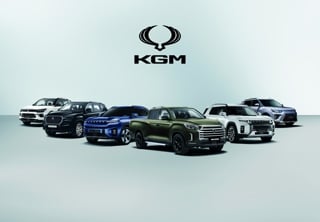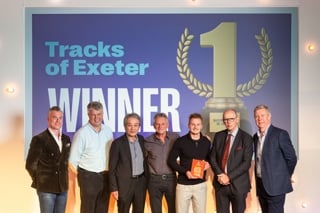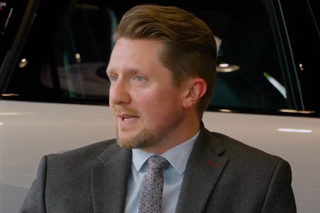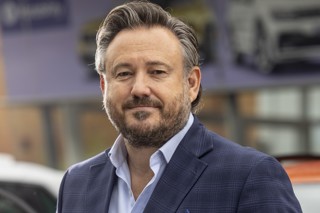[gallery id=1098]
Founded in 1971 by Robin’s father, Colin, as a retailer of Honda and Suzuki motorcycles, the company became the first in the UK to sign up for Suzuki cars in 1979 and has represented the Japanese carmaker since, expanding with it into four locations: the original in Keighley, then Huddersfield, Ashton-under-Lyne and Shipley.
Today, Colin Appleyard accounts for 4.5% of Suzuki’s new car sales in the UK and its dealerships have built up local market shares of about 8%. It’s an impressive position for franchises with a niche brand (Suzuki has a 1.3% slice of the national market). Alongside its main partner, it also represents two other Japanese carmakers: Nissan and Subaru.
[gallery id=1098]
Yorkshire dealer group Colin Appleyard is a car-retailing machine. “We are a new car operator. Our primary aim is selling as many new cars as we can,” said managing director Robin Appleyard.
Founded in 1971 by Robin’s father, Colin, as a retailer of Honda and Suzuki motorcycles, the company became the first in the UK to sign up for Suzuki cars in 1979 and has represented the Japanese carmaker since, expanding with it into four locations: the original in Keighley, then Huddersfield, Ashton-under-Lyne and Shipley.
Today, Colin Appleyard accounts for 4.5% of Suzuki’s new car sales in the UK and its dealerships have built up local market shares of about 8%. It’s an impressive position for franchises with a niche brand (Suzuki has a 1.3% slice of the national market). Alongside its main partner, it also represents two other Japanese carmakers: Nissan and Subaru.
Colin Appleyard’s total new car volume in 2016 is forecast to pass 1,700 units, possibly breaking its 2014 record of 1,740.
Underpinning its success are family values, brand expertise and a workforce of loyal employees – half have served with the company for more than 10 years, and almost a quarter have stayed for more than 20.
Appleyard said he believes the company’s strapline of ‘feel like family’, and the values that define it, are a real strength to the business, because people want to buy from people they trust and have built a relationship with.
“Our customers come back time and time again, and the ‘feel like family’ is what we’re all about,” he said. Inside its showrooms, the group’s ‘APPYS’ – its values of Attitude, Part of a team, Proactive, Your promises and Success – are displayed for staff to see.
The same ethos applies to its dealings with Suzuki. While there are always challenges and disagreements, Appleyard believes the ability to have a sensible conversation with the carmaker means that there is always a favourable compromise to be reached.
Colin Appleyard, who received an MBE in 2012 for his services to motorcycle sport, was still active in the business until his death last year. His widow, Peggy, now serves as chairman. Robin Appleyard’s sister, Judith, works in administration and his eldest son, Jack, has recently taken a sales executive role at its Nissan dealership.
Appleyard and finance director Tony Dodsworth describe their roles as very hands-on. The group does not have dealer principals at each site; instead general sales managers are responsible for each site’s teams and sales, while Appleyard and Dodsworth monitor performance and profitability and are in contact with their sales managers daily.
One thing they don’t expect from every site is for managers to go through the accounts every day.
“All I’m interested in from our managers is how many cars they’ve sold that day and then if we’re doing enough we can talk about whether they’re making money per car or not. But until the wheels are going out the door you can’t do anything,” said Appleyard.
The managers have monthly targets for new and used sales plus profit per unit and F&I sales. They also have year-end incentives linked to their sites’ accounts. However, Appleyard believes there is little point in their spending hours analysing accounts when they can’t control the business overheads or supply agreements.
“We need them focusing on the gross profit, which they can affect, and we’ll look after the net profit and where we can save a bit of money, we do so,” said Appleyard.
“If the sales process is followed properly, the success rate goes through the roof and profitability is there. Whenever you see a salesperson who is underperforming, it is always because he’s not utilising the sales process. He’s not asking the questions. If he does that in a nice, friendly manner and they’ve come in to look at a proper product which is good value, you’re there.”
Such emphasis on new car sales requires a well-practised approach to marketing. Appleyard sees it as the manufacturer’s job to raise awareness and bring conquest customers to the showroom door – Suzuki’s recent sponsorship of Saturday prime-time show Ant & Dec’s Saturday Night Takeaway has had a significant effect, he said.
Nevertheless, the group invests in local newspapers and radio, poster sites and search engine optimisation (SEO) for its website, and occasionally buys in some data. All its demonstrators and company cars carry promotional lettering, even the car used by the company chairman.
Yet one of its most important methods is the tactical sales event. It starts with local advertising and direct mail to sections of the group’s 40,000-strong customer database, but the key aspect is the follow-up call to make appointments, and the excitement and incentives for the sales executives. Here Appleyard gets involved personally: “We probably don’t do it any different to anybody else, but if you drive it hard enough it does work every time.
“The trick is getting the team revved up to get on the phones and book those appointments. I say that it isn’t about the deal on the table for the customer, it’s the deal that the salesman thinks is mega, so he’ll sell it to the customer.”
There are rewards for those who do perform. Appleyard said the company pays well because it wants to keep people. In addition, it has a profit-sharing scheme, which puts 15% of any earnings over each sites’ target profit into a pot for dividing between the staff at the branch. Dodsworth said this could be worth between £250 and £1,000 a year to staff members.
“Every site has a benchmark profit that it needs to achieve because we have to re-invest. Breaking even is no good,” said Dodsworth.
It also prefers to promote from within, and to develop the workforce. Training sessions are held every two months for the sales teams.
“These people who have been with us a long time, me and Tony included, we also have to improve ourselves. The difficult thing is the management of a bigger team and a busy environment and coping with the opportunities to sell a load of cars and make money. That is the opportunity we have to grasp.
“Now we are a top 200 dealer we’ve got to start acting like one. I still see ourselves as a small family business, which we are, but, with our sales, we’re not a small business anymore.”
Since the turn of the decade, the group has diversified its portfolio slightly – founder Colin felt it was risky to be reliant on one brand’s fortunes. First came Subaru franchises at Huddersfield and Ashton-under-Lyne, which Appleyard describes as low on generating sales due to cheaper competition, but a welcome source of aftersales profits. Three years ago Colin Appleyard acquired a Nissan franchise in Keighley, when Co-Op Motor Group quit the aggressively growing Japanese brand. Colin Appleyard bought the property and business with all the staff, but there was no customer database – “technically it was a cold site”, said Appleyard – and it is only now beginning to turn a profit.
“The business is growing all the time. It’s taken probably 12 months longer to get decent footfall because of it being a cold site. But it’s a strong brand,” he said.
Working with other manufacturers has helped the group to learn some new disciplines. Appleyard described Nissan and Suzuki as like ‘chalk and cheese’, but said Nissan’s emphasis on CSI, in-depth management reports and service plan sales has helped to re-focus other sites in the group.
For example, now the group has about 1,400 customers on service plans and sales executives are targeted to achieve 75% sales penetration – the company’s data shows it is achieving 50% resale retention with customers who bought a service plan with their car, so everyone is made aware of its importance.
“It all makes us think, yes we need to have a little bit more accountability of sales managers if we’re to keep successfully managing the growing group,” said Appleyard.
His immediate focus is on building on its profitability – in its last year the group achieved 1.7% return on sales, said Dodsworth, which is well above the UK dealer national average of 1.22% (source: ASE). However, he wants a 2% return from the year ahead.
Growth is certainly coming. Suzuki is launching four cars in the next two years, including a new Swift supermini, a Baleno supermini and an Ignis small crossover, and it has ambitions to increase its national new car volume from 35,000 to 45,000 units annually.
Appleyard has plenty of confidence in the carmaker’s plans: “If the market stays as it is and we can continue with the consumer offers and the economy stays good, passing 40,000 in the next two or three years is very achievable.”
Capacity has become an issue, so there are several developments in the preparation stages at Colin Appleyard. The Keighley site housing Suzuki will be reconfigured to provide more space for new and used cars and better customer parking. Appleyard sees this creating an opportunity to increase annual sales by 100-150 units and to improve the customer experience.
The group is also looking at suitable properties to house an offsite PDI centre, which will serve the whole group. Currently, its service workshops are at full capacity, so the ability to move the internal work elsewhere is seen as a crucial element of the group’s ability to cope with Suzuki’s growing car parc.
The group also recently recruited Andrew Ogle, who had worked for it previously until 2014, as its first group sales manager with a brief to support Appleyard and Dodsworth in overseeing all the dealerships and to help the sales managers manage processes and manufacturer incentives.
Growth will be funded from the group’s own coffers where possible. Appleyard said the company rarely uses its overdraft outside the plate-change months, and none of its properties is under mortgage.
“Funding costs money, it’s eating into your profits straight away,” said Dodsworth, who puts a lot of emphasis on balancing cashflow to support daily operations. Colin Appleyard’s gearing has been below 10% for several years and during the last recession the business made just two redundancies.
The prudent approach to funding that Appleyard’s father instilled in the business is echoed in the group’s ambitions. Appleyard said: “We’re not looking to expand. We have to improve and grasp the opportunity we’ve got with our current set-up. We can do more with what we have right now.
“I don’t think we’re a company that’s ever gone out specifically to try and force people’s hands. I think the opportunities have come along at the right time.”
While he has seen other groups expand rapidly using manufacturer money and mountains of debt, Appleyard’s cautious approach seems intent on ensuring his father’s creation will last for decades yet.
Investing in customer relationships
Aspects that some dealer groups may view as a cost are seen as longer-term investments at Colin Appleyard.
Its dealerships hold frequent non-sales events for customers, such as its annual meeting for Honda Goldwing owners and enthusiasts at its multi-brand motorcycle dealership in Keighley. The site doesn’t hold a Honda franchise, but nevertheless attracts more than 300 bikers on the day.
Any customer with a Colin Appleyard service plan is entitled to call into the group’s dealerships fortnightly for a free car wash. The take-up is so strong – about 30 washes weekly at each site – that Appleyard said he’s having to look at employing extra people at some sites just to do the washes. “It’s hard to calculate the good it does, it is a cost, but at the same time it’s fantastic for the footfall it drives to the showroom and for customers getting to know us as friends.
“So it’s a nice problem to have, but it is a problem.”
Login to continue reading
Or register with AM-online to keep up to date with the latest UK automotive retail industry news and insight.






















kevin - 04/05/2016 12:54
The Leicester of the motor trade Robin is a man of his word